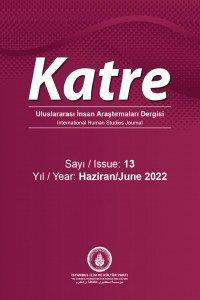Risale-i Nur Işığında Ümit ve Ümitsizlik
Umutsuzluk ve ümitsizlik modern dönemde insanlığın üzerine karanlık bu-lutlar gibi çökmüştür. Materyalizm ve Sekülerleşme insanın ümit kaynağı olan imanı zayıflatıp kesti. Daha yoğun ve geniş çabalar modernizmin sembolüne ulaştı ama günümüz dünyasında “daha iyi bir dünya için müsbet hareket” ha-len tanımlanıp gerçekleştirilmeyi bekliyor. Dünya savaşları, soğuk savaşları, nükleerleşme, çevre kirliliği, ekolojik kriz, askerileşme, ekonomik ve sosyal uyumsuzluklar müsbet hareketten haber vermiyor. Bediüzzaman Said Nur-si hem sözleri yani Risale-i Nur ve azami acı, sıkıntı, hapis, yabancılaşma ve sürgünle geçen kendi hayatı vasıtasıyla insanlar arasında ümidi hayatta tut-maktadır. Kur’an’daki tevhide ve ahirete imanı işleme prensibini uygun olarak Nursi Kur’an’daki bu dünyada verilen konusunu iyi değerlendirilirse failine sevab kazandıran bir imtihan olarak tefsir eder. Böylece, eğer onu bir imti-han olarak kabul eder, hissiyatını dizginler ve Allah’ın hakiki kullarının şiarı olan bir tavırla davranırsa, şiddetli bir buhran bile yüksek ahlaki ve manevi mükafatlar kazandıracak bir fırsat olabilir. Hazırdaki global durum çok sıkıcı olsa bile müminleri ümit üretmeye ve onu devam ettirmeye davet eder ki bu tek başına dünyanın ıslahı için müsbet bir harekettir. Meselenin alakasını göz önünde bulundurursak bu çalışma iki kaynak üzerinedir: birisi Kur’an’ın konuya bakışı diğeri konunun beyanı için arz ettiği bağlamlarla Said Nursi’nin Risale-i Nur’udur.
HOPE AND DESPONDENCY IN THE LIGHT OF RISALE-I NUR
Despondency and hopelessness has cast its dark clouds on humanity across globe in the modern period. Materialism and Secularization have weakened and severed man’s fount of hope—faith in religion. However, action and more intensive and extensive actions have attained the symbol of modernism, but “the positive action for a better world” is yet to be defined and actualized in the contemporary world. World Wars, Cold Wars, Nuclearization, Environmental Pollution, Ecological Crisis, Militarization, Economic and Social Disparities do not speak of positive actions. Bediuzaman Said Nursi keeps up the hope alive in humans through his words–Risale-i Nur and his life–lived through extreme pain, suffering, imprisonment, alienation and exilement. True to the Qur’anic notion of cultivating faith in the Oneness of God and in the Day of Reward-Hereafter. Nursi expounds the Qur’anic theme of ‘the given in this world’ as a test which if appropriated positively could earn blessings for the doer. Hence, even acute crisis one faces is an opportunity for acquiring high moral and spiritual rewards if one takes it as a challenge and restrains his emo-tions and conducts himself in the worthy manner which is the hallmark of real servants of God. The current global situation, though being very depressing calls for faithful to generate hope and keep it alive, which alone can ensure a positive action for the betterment of the world. Keeping the relevance of the subject in view, the study would be conducted on two referents: one the Qur’a-nic position and the other Said Nursi’s Risale-i Nur along with the contexts he propounded the ideas to fully contextualize the pronouncement on the subject.
___
- Abu Rabi, İbrahim, Spritual Dimensions of Bediuzzaman Said Nursi’s Risale-i
Nur, State University of New York Press, Albany, 2008.
- Colin Turner, Hasan Horkuc, Said Nursi, Oxford Center for Islamic Studies, I.B.
Tauris, London, 2009.
- Ian Markham & Ibrahim Ozdemir, Globalization, Ethics and Islam, Ashgate Pub-lishing, USA, 2005.
- Ian Markham & Sunendam Birinci, An Introduction to Said Nursi, Life, Thought
and Writings, Ashgate Publishing USA, 2009.
- Said Nursi, Risale-i Nur, (tr. English) Sukran Vahide, Barla Publications, New
Delhi, 2015.
- Serif Mardin, Religion and Social Change in Turkey: The Case of Bediuzzaman Said
- Nursi, State University of New York, Albany, 1989.
- Sukran Vahide, Islam in Modern Turkey: An Intellectual Biography of Bediuzzaman
- Said Nursi,State University of New York Press, Albany, 2005.
- Sukran Vahide, Jihad in Modern Age: Bediuzzaman’s Interpretation of Jihad, http://
iikv.org/academy/index.php/symp/issue/view/2
- Sukran Vahide, The Author of Risale-i Nur, Bediuzzaman Said Nursi, Sozler Istan-bul, 1992.
Third International Symposium on Bediuzzaman Said Nursi (24th-26th Septem-ber), “The Reconstruction of Islamic Thought in the
Twentieth Century and Bediuz-zaman Said Nursi”, Istanbul, 1995, Vol.2.
- Thomas Michel, Insights From the Risale-i Nur, Tughra Books, New Jersey, 2014.
- Thomas Michel, Said Nursi’s Views on Muslim-Christian Understanding, Soz Ba-sım Yayım, Turkey, 2005.
